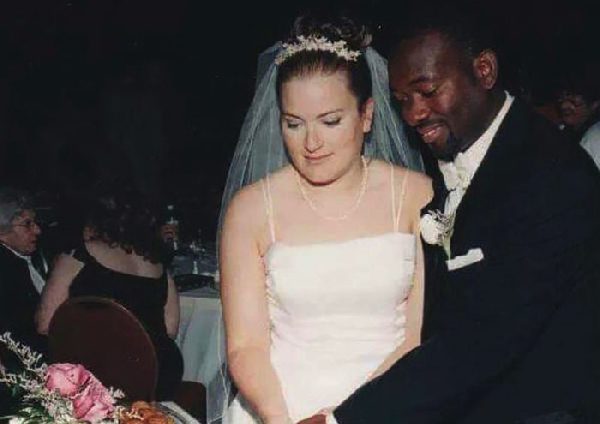 |
| Rahiel Housey-Johnson at her wedding |
DEARBORN — Arab Americans who marry outside their race face bigotry and suspicion from friends, family and community members who look upon interracial marriages with skepticism.
Nada, a Dearborn resident who wished to be identified by her first name only, said her family disapproved of her Black husband.
Nada, who got married in August, said she was excited to introduce her groom to her friends and family, but was quickly discouraged by the gossip and long stares.
She said she and her husband were disappointed in the community.
The Lebanese American woman said some Arab Americans acted like her husband was a “Martian” and some family members and friends cut ties with her.
“People showed their true colors,” Nada said.
Although Nada’s husband is Muslim, she said some relatives were worried that the marriage will affect her culture and religion.
She added that some Arabs in Dearborn were blatantly racist towards her husband, calling him an “abed”, Arabic for slave.
Nada also said her husband was stopped from entering a local market out of suspicion.
“Our community is very closed-minded,” she added.
Nada said she knows two women who are “madly in love” with respectful, well-off men, but cannot marry them because they are of different racial backgrounds.

“They’re heart-broken, but their parents are forcing them to meet other guys,” she said.
Nada said she is embarrassed by the way some Muslim community members portray African Americans.
“The Quran specifically tells you not to be racist,” Nada added.
Nada recalled an encounter with Muslim African Americans who were surprised by her marriage. They told her that many Arabs are often racist toward Blacks.
“I don’t know how you guys could be racist when you know how it feels,” said one African American to Nada.
Rahiel Housey-Johnson, a Lebanese American teacher in Hamtramck,
also said she experiences negative reactions from community members because her
husband is Black.
Housey-Johnson met her husband while volunteering with the Peace Corps in the Caribbean in 1998. She said their relationship was perceived as a scandal by her family and friends.
“Some of my family was upset and didn’t want to meet him,” Housey-Johnson said.
She added that none of her relatives attended their wedding.
Every year, Housey-Johnson’s husband visits her class on the first day of school. She said the young students’ reactions to his race are of awe and confusion.
She said many of the majority Yemeni students cannot believe that she is married to a Black man, adding that their wide-open eyes and body language express intense surprise.
“Your husband is Black,” a student once told her, sounding astounded.
Housey-Johnson said she is not totally surprised by such reactions, especially in Hamtramck, because interracial and intercultural marriages have only become more common in the last 10 years.
Housey-Johnson advised community members and parents to ask themselves why they react with confusion and fear; and to recognize that people acquire different sets of experiences.
She also urged couples who experience backlash to react with kindness and patience.
Batoul (not her real name), of Dearborn, has a White fiancé. She said her mother was reluctant to accept the engagement.
“I’m not going for anybody that doesn’t speak Arabic,” said Batoul’s mother. “How can I communicate with my new son?”
Batoul said in the Arab American community, a female marrying a non-Arab is seen as “a scandal and a shame.”
However, when Arab men marry non-Arabs, family members would be reluctant at first, but they accept the marriage as time passes.
Batoul also said she has many friends in long-term relationships with non-Arabs, but they hide their relationships from their parents.
Batoul asked community members to be more critical of their sense of supremacy, especially Lebanese people, whom she said think of themselves as more progressive than other Arabs.
Mariam, a Lebanese pharmacy student who also wished to only be identified by her first name, said she would marry a non-Arab because love is not determined by culture or race.
Although her parents’ happiness matters to her, she said love and happiness are the keys to a successful marriage, which shouldn’t be limited because of a person’s ethnicity.
“My family would temporarily not talk to me, but eventually gave in,” Mariam said. “I highly doubt they would attend any wedding, so I would probably elope.”
The Arab American community’s tendency not to accept other cultures and races stems from their struggle to assimilate into the American culture, said Kristine Ajrouch, professor and interim head of Eastern Michigan University’s sociology, anthropology and criminology department.
Ajrouch said when the early waves of Arab Americans immigrated to the United States, they fought hard to be categorized as White, instead of Asian, because Asians were not allowed citizenship in the early 1900’s.
Ajrouch said members of immigrant groups can be racist toward other minorities and have White spouses to adopt a White identity and distance themselves from a minority identity. This could mean adopting unfavorable attitudes towards those who are not in their group.
“When you are considered part of the whole White identity this is internalization of racism,” Ajrouch said. “because if you’re White, it means that somehow you have privileges.”






Leave a Reply